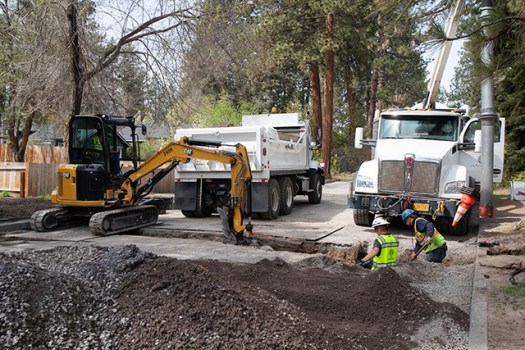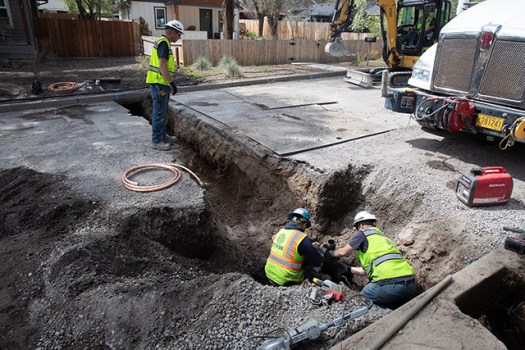Bend set to hike fees for road maintenance
Published 2:35 pm Friday, April 25, 2025
Last year, Bend residents and businesses began paying a new fee to help maintain the city’s roads. Now, the cost is about to go up.
After months of workshopping, the city last week published a proposed hike to its transportation utility fee, which is a charge tacked on to utility bills. The Bend City Council could approve the new fees after a May 7 public hearing, with new charges coming July 1.
For residents, that could mean $4 to $6 more per month, while some businesses’ bills could rise by hundreds of dollars.
For the city, the fee is a tool to close the widening gap between maintenance needs of an evolving transportation system and the funds to pay for it. More than 30 cities across Oregon have adopted a transportation fee to compensate for declining gas tax revenue and limited property tax allocations.
The fee not only offsets declining revenues and increasing costs, but allows the city to expand its budget for street maintenance, said David Abbas, who directs the city department in charge of road maintenance. The fee is used for pavement work, plowing, sweeping, striping, upkeep of the city’s growing number of sophisticated bike lanes and more. The city has more than 900 miles of road lanes to maintain. That figure has grown by 10% in the past five years.
With the current level of spending, Bend would not be able to maintain its pavement to the current condition, according to city reports. To reach an “optimal” level of pavement conditions — 84 out of 100 on the “pavement condition index” rating — the city needs to spend more than $100 million through the end of 2028 to remedy a maintenance backlog.
The city ultimately wants to generate $15 million each year from the transportation fee, but opted to gradually work up to that target by phasing in new charges over three years, aiming to collect $5 million in the first year and $10 million in the second.
Plans to raise the fee later were made clear in 2024 when it was adopted.
But that doesn’t soften the sting of the new charge.
“It’s gonna hurt,” said Katy Brooks, CEO of the Bend Chamber of Commerce.
Who should pay, and how much
Members of the Bend business community have been involved with planning for the second phase of the fee since December, and recently provided a set of recommendations to the Bend City Council through the Bend Economic Development Advisory Board. Aiming to reduce impacts to businesses, the advisory body pitched a recalibrated fee structure shifting a larger piece of the pie to residential accounts instead of business accounts.
Charges to residential accounts make up 53% of the revenue generated by the fee, and non-residential accounts, including businesses, make up the rest. The business community recommended fully doubling residential fees and bumping the share to 60% — a difference of $1.10 per month for a household and anywhere from a $30 to $600 difference for businesses.
The city council at an April 17 meeting finalized its proposal, falling somewhere in the middle between the current fee structure and recommendations of the business community.
Councilor Mike Riley said he preferred to keep the original ratio in place.
“Everybody in the community faces different kinds of financial challenges,” said Councilor Mike Riley. “There’s lots of people, whether they’re residential customers or commercial customers, and lots of chaos and uncertainty right now. We all face that in different ways. I don’t want to put a value judgement on one type of customer versus the other.”
Councilor Megan Perkins said the city should adjust the fee burden in favor of businesses, citing the potential for some to be hit with a sizeable increase.
“These things add up,” she said. “These are people that employ people in our community.”
Drop in the bucket, punch to the gut
Single-unit households are paying a $5.60 monthly transportation fee, while multi-unit households are paying $4.15. Households that qualify for utility assistance pay less.
Business accounts don’t qualify for assistance. Their rates are multiplied by a square-footage formula, meaning those with larger buildings pay more. On average, non-residential utility accounts are paying $92 per month for the transportation fee. Five pay more than $1,000, and the most one business pays is $1,524.
Along with raised rates, the fee’s second phase categorizes businesses into “bins” — each with a different fee rate — based on how much wear and tear they put on Bend streets. The city used a federal statistical model to calculate the impact of different types of businesses and group them together. Businesses that generate high traffic such as restaurants, banks and supermarkets have the highest rates while places like warehouses, industrial parks and churches fall at the other end.
The city council gave a break to some businesses, such as restaurants and medical offices, by dropping them to a lower category than they were assigned by the formula.
Still, raising the fee “feels like a gut punch” to Clayton Horn, who bought Planker Sandwiches on Wall Street downtown after working his way up as an employee. Horn said the sandwich shop has to carefully budget the money it makes during the busy summer months to stay open throughout the winter. He said raising fees adds pressure to that balancing act, even if the increase in isolation may not seem like much to absorb.
“Overall, it’s going to be a drop in the bucket,” he said. “But the issue is there’s a lot of drops in the bucket.”
“Eventually it’ll sink your boat,” he added.
Increased fees also come as downtown businesses are dealing with road closures, changes to parking and new street designs to accommodate walking and biking. Uncertain economic factors, such as tariffs, which are impacting more than 70% of Bend businesses, are also at play, Brooks said.
DaWayne Judd, who has owned Mirror Pond Dry Cleaners downtown since September, said the amount he pays for the transportation fee fill will roughly double once the update goes into effect.
But he views the fee as an investment that will pay off in the long run in the form of well-maintained streets.
“It’s a cost we have to bear to ensure that community members are able to reach our store,” he said.
About 20 people not involved with the business community have also written to the city about the fee update, mostly expressing concern about cost, said Sarah Hutson, a city of Bend management analyst who is leading the transportation fee project.
Both business owners and residents are bracing for another potential increase to the fee next year, with the city ultimately aiming to collect $15 million. But Hutson said the city council has committed to discussing other ways to collect money for transportation needs before going back to the community for more fees, including ways to generate revenue from visitors.
The business community will likely push for solutions other than another fee increase, said Brooks, of the chamber of commerce. It’s unclear what the national economic picture will look like next year, and how much more cost business owners can bear.
“I think one more hike is going to be really, really tough,” she said.









